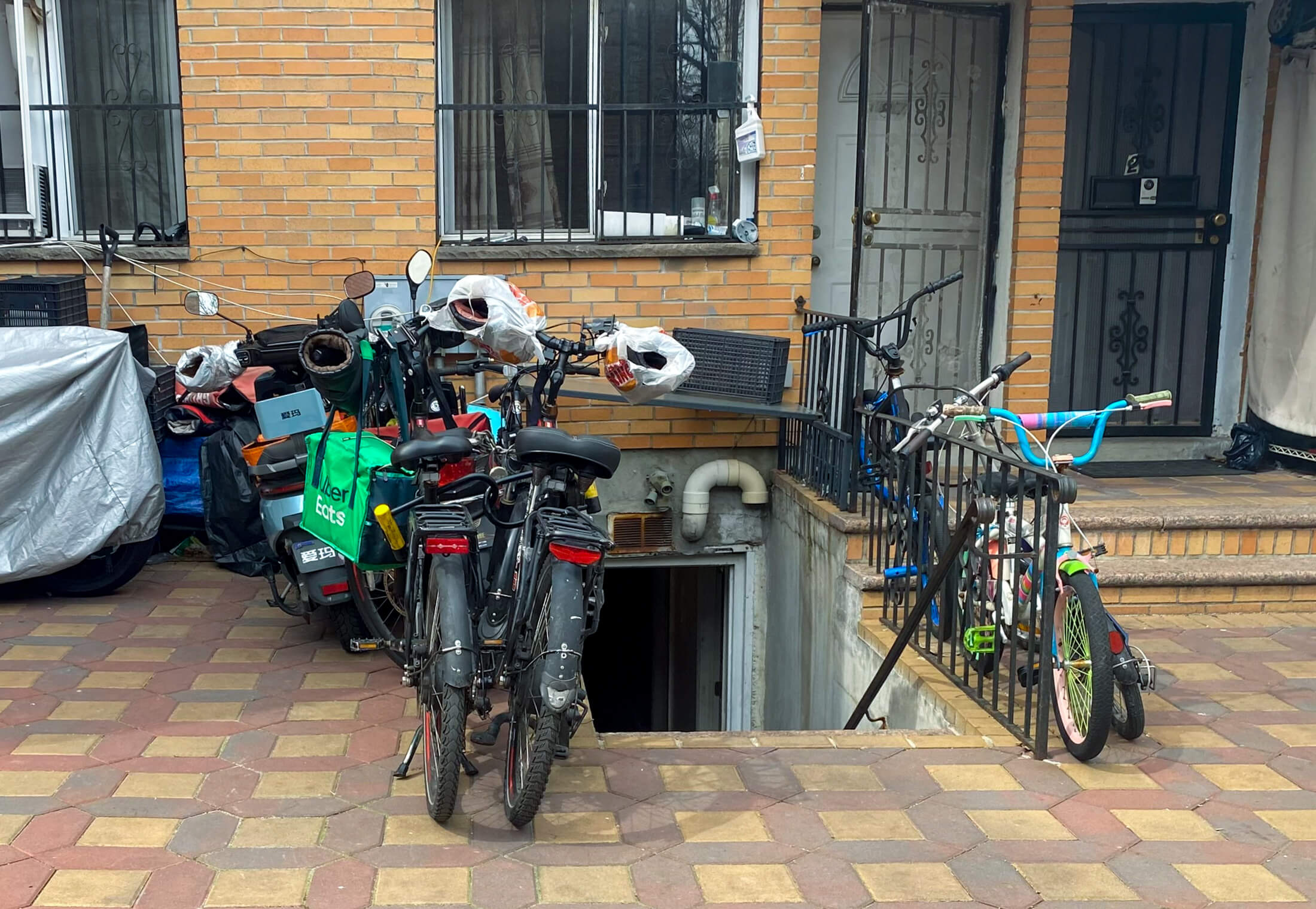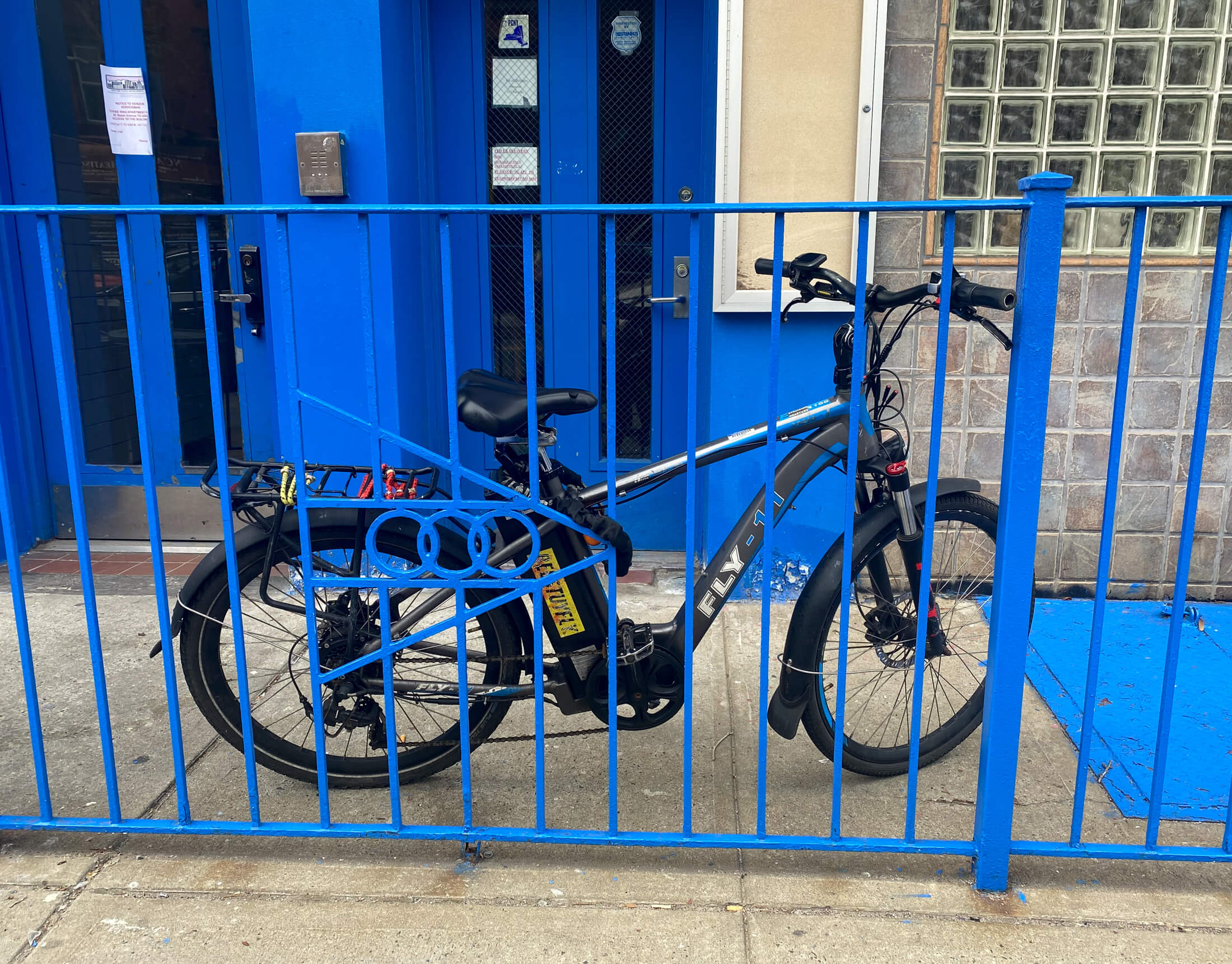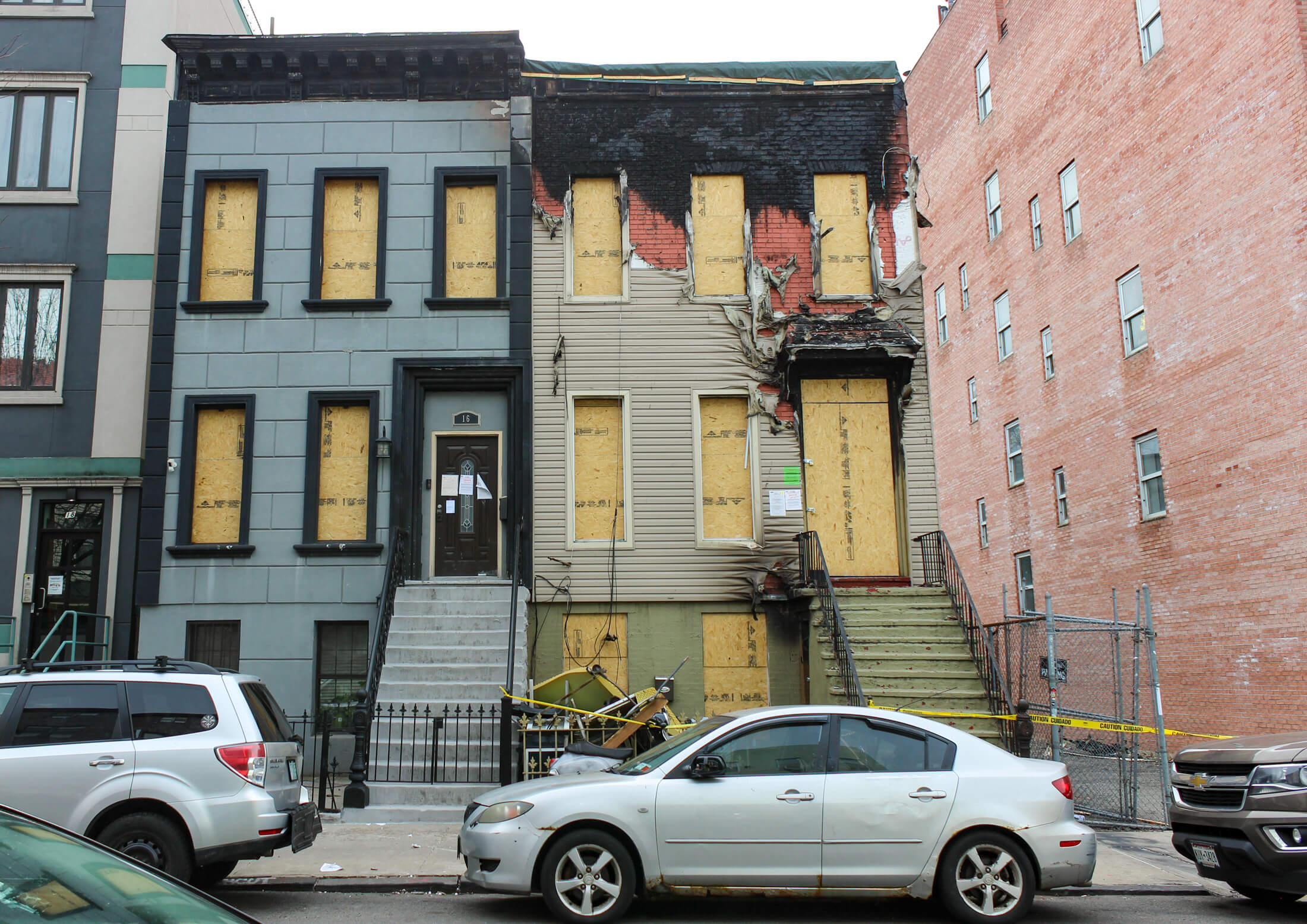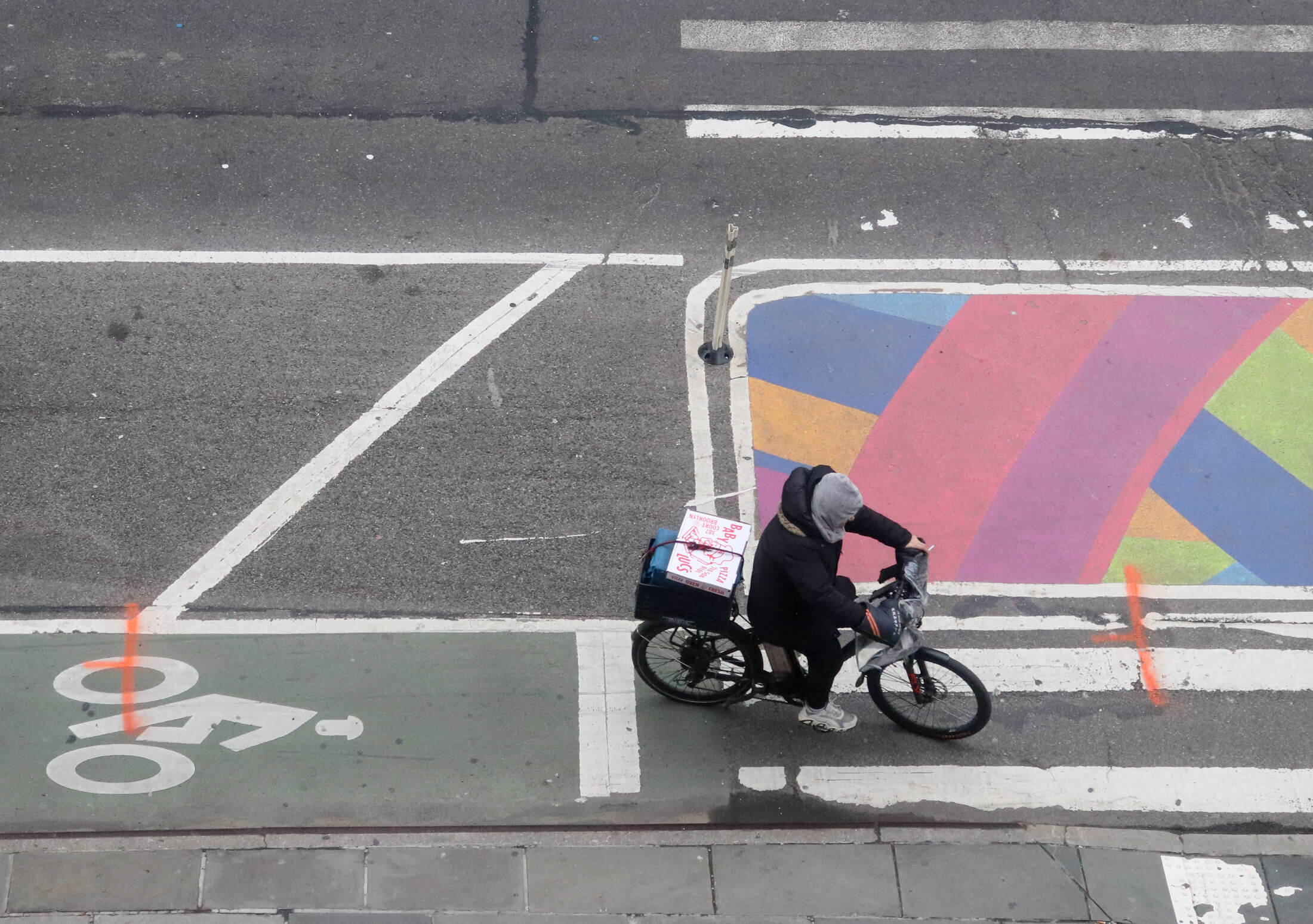Mar. 20, 2023 By Anna Bradley-Smith
A few months ago, Mona Biblow’s co-op board banned all electric bikes from her 72-unit building in Kensington. Looking out from her living room on the seventh floor, she said she understands why.
Across the street, a number of windows in a large residential rental building remain boarded up after a fire tore through apartments, she said. At first she heard it was caused by an e-bike battery, but has subsequently heard it could have been faulty wiring. Regardless, she said, she doesn’t want to be in the same situation as those whose homes went up in smoke.
“I don’t think [the board president] was fighting with anybody with [the ban], you know, everybody seemed to be on board with it, because it’s scary, it just is.”
Biblow, who has owned her apartment for 40 years and rented it before that, is one of the increasing number of New Yorkers facing restrictions or outright bans of e-bikes or their batteries in their buildings. As the city makes moves to restrict the batteries, which have been the root cause of more than 30 fires just this year and at least eight deaths since the start of 2022, so too are individual landlords, co-op, and condo boards taking action.

Delivery bikes in front of a Bed Stuy building
The fires are largely being sparked by poorly made, uncertified lithium ion batteries, oftentimes ones that have been tampered with or are being used with a mismatched charger, FDNY Commissioner Laura Kavanagh said. These cheaper and more powerful batteries are more affordable to and needed by delivery drivers across the city who have to trek dozens of, sometimes more than 100, miles a day delivering food and goods.
Certified or not, the batteries are proliferating across the country. In 2021, 880,000 e-bikes were imported into the U.S., compared with 287,000 in 2019, according to Consumer Reports.
As the sight of e-bikes and the fires caused by their batteries increase in New York, it’s not just residential building owners getting worried. Brownstoner heard from tenants who had reached out to landlords asking for restrictions and from others who are facing restrictions or bans on e-bikes at work. But not everyone supports the blanket bans: Some people said on social media that outright bans will hamper a transition to more sustainable transport methods, and many agree that batteries that have been certified should be allowed indoors.
Biblow said although she didn’t get a say in the change to her co-op’s house rules banning e-bikes, she didn’t mind and, so far, she said, nobody seemed upset about it. However, she doesn’t think any existing homeowners owned electric bikes.
The same goes for Dan Rodriguez, who also lives in Kensington and came home this week to a sign in the lobby saying e-bike batteries have been outright banned in the building. Rodriguez said although he had thought of buying an e-bike in the future and the news put a pause on those plans, he didn’t mind and he said no one else in the building seemed to either. Like Biblow, he thought no one in the building actually owned an e-bike to begin with.
Last year, one of the largest co-ops in the city, London Terrace Towers in Chelsea, debated banning e-bikes from residential apartments at the suggestion of its property management company Douglas Elliman, The City reported. Some homeowners said it would be an overreaction, and the board is still considering the issue, a rep from Douglas Elliman told Brownstoner.
It is an issue property management companies are also increasingly having to face. Chris Alker, building operations manager at Akam, whose a portfolio includes more than 340 properties and more than 68,000 units in New York City, told Brownstoner the firm reached out to all its boards early on with a memo about fire and life safety.

An e-bike locked behind a fence in Bed Stuy
“We’re not recommending to our boards they ban, we can’t make that recommendation because it’s entirely up to them, but I think it’s a no-brainer that if you don’t have them in your building, then that fire risk is not there anymore,” Alker said. Instead, the firm is focused on providing information about fire prevention with the batteries, and it has been conducting fire and life safety inspections, noting when e-bikes are stored in common areas.
“I think trend wise we are seeing a handful of buildings that are banning the bikes, more so in buildings where they’re not very popular,” Alker said. “Because if it’s not illegal, and you have 50 residents who have bikes, and then you ban them, you’re gonna get an uprising in your building.” He added that increasingly they are seeing lawyers draft bylaws that ban the batteries. He has also seen a different approach where buildings require the e-bikes to be registered — although that brings up questions around liability, he added.
The issue Alker sees with both building and city rules is who will be tasked with enforcement. “One of the biggest trends we’re seeing in buildings, in terms of compliance — for example in clearing violations and/or outlawing things in buildings — is [that it is] frequently driven by insurance requirements…I’m sure they’re already jumping up and down on it right now,” he said.
Attorney Jeffrey Schwartz, a partner at real estate-focused law firm Schwartz Sladkus Reich Greenberg Atlas LLP, said although he hasn’t heard of any change in insurance policies regarding e-bikes, he is “sure it’s coming.”
Schwartz said many of the firm’s co-op and condo boards had increasingly been seeking consultation on the issue of batteries (it even took up the first 15 minutes of a partner meeting this week when it wasn’t on the agenda).
“Many of them are considering outright bans and have asked us to propose language to them which would allow them to do so, to put them in their house rules or organizational documents,” he said. “Others are shying away from the outright bans, but are requiring registration evidence that anybody who has such a bike or with that type of battery has appropriate insurance and getting confirmation that their insurance would cover if there were ever a problem.”
He said some buildings are even considering fire-resistant bike rooms, pursuant to the New York Fire Department’s standards.
To ban e-bikes or their batteries in co-op or condo buildings, Schwartz said that while changing the proprietary lease or bylaws is the most secure and enforceable way to go, boards can also just adjust the house rules.
“I do think it works because in most of the house rules for co-ops that we see out there, there is some reference to, ‘you can’t store bicycles in the hallways, you can’t bring them up in the elevators,’ and I think that this is more of a continuation of that. I think there’s nothing in the proprietary lease that is in opposition to that,” he said.

In February a faulty e-bike battery started a fire on Goodwin Place in Bushwick
With registration, some buildings require the batteries meet FDNY safety standards and are used safely. Others require e-bike owners to sign a form saying their insurance will indemnify the other homeowners and the building for any damage if the battery causes a fire, Schwartz said.
“I don’t think I would ever sign something like that, certainly I wouldn’t sign it without knowing that my insurance company would cover in the event something were to happen,” Schwartz said, adding they are all possibilities buildings are looking into. But, he said, without a doorman, enforcement remains an issue.
Attorney Brian Zimmet of Zimmet Law Group P.C. said to date he hasn’t experienced many buildings seeking bans on the batteries, but said they are watching closely for industry-related data. “It’s a fluid situation,” he said. “If changes come, it will be driven by recommendations by the management companies.”
UL Solutions, a global safety science company that certifies the safety of numerous consumer goods, has released a UL certification for e-bike batteries, however UL Solutions Director & Global Industry Leader Ibrahim Jilani told Consumer Reports many companies in the industry were reluctant to spend the time or money on certification. “They feel like there’s no government regulation,” he said.
The city and FDNY have sent letters to the Consumer Product Safety Commission, the agency that by default governs e-bikes but has hardly caught up with their proliferation. The letters ask the commission to seize any batteries that are not UL Certified. But with all goods under $800 crossing the US border without need for inspection thanks to a 2016 law change, and many companies therefore pricing their e-bikes and batteries at $799.99 or below for that reason, it would be a huge task for the agency to undertake. While the organization said it is reviewing feedback, governance of the batteries still largely falls back to local authorities at this stage.
Small Bed Stuy landlord John Ocasio isn’t taking any risks. He said going forward he would likely add a blanket statement in a lease rider saying “no e-bikes allowed due to the potential fire hazard.”
“I will definitely consider including a no e-bike clause to any leases going forward,” he said. “I’m not waiting to show up on the news. No e-bikes for me.”
Meanwhile, real estate agent Benjamin Czuprinski just added a clause to a lease for the first time barring tenants from having e-bikes in their Fort Greene apartment. He said the landlord, who lived downstairs from the apartment being rented, didn’t want to take any risks.

A worker on an e-bike delivers pizza in Downtown Brooklyn. Photo by Susan De Vries
Last year, New York City’s largest landlord, NYCHA, proposed an e-bike ban on its properties, which was met with outrage from those who said many delivery workers would have to choose between having a job and having a roof over their heads. The agency opened the proposal to comments and so far has not moved forward with the ban.
A spokesman for the agency told Brownstoner: “NYCHA has been diligently reviewing comments, continuing its technical research, and meeting with experts and stakeholders to determine the best course of action moving forward, and we will continue to work with our partners in the City to provide safe homes to our residents. At this time, there is no new rule in place, and therefore no date for implementation.”
While landlords and boards weigh their options, many expect it won’t be long before insurance companies start tweaking policies around e-bikes and their batteries, given the increasing losses incurred by recent fires caused by the batteries.
Tony Cotto, National Association of Mutual Insurance Companies auto and underwriting policy director, told Brownstoner many NAMIC member companies are already “actively analyzing these issues, and individual members treat this topic differently.”
“Safety is the primary concern when it comes to e-bikes and battery storage and usage,” he said. “As e-bikes continue to become more common, insurers will continue to refine efforts to assess the risks they pose as accurately as possible both when in use and while charging.”
National Bicycle Dealers Association President Heather Mason told Consumer Reports some insurance companies are refusing to insure bike shops whose stock is more than 50 percent e-bikes. In one case, State Farm sued a bike manufacturer itself, alleging one of its e-bikes caused $250,000 worth of damage to a home and cars that State Farm insured.
Ligia Guallpa, executive director of Workers Justice Project, a group that represents the city’s delivery drivers, told amNY there are around 65,000 delivery drivers in the city who use e-bikes and need to charge their batteries, “and they have no other place than their own homes.”
“The reason these fires are happening is not just because of bad unsafe batteries. It’s because of the lack of infrastructure that exists in our city,” she said, adding the drivers know the dangers of uncertified or altered batteries, but often do not have other options — and the same goes for charging.
Guallpa told Brownstoner that Workers Justice Project “fully supports the City Council’s efforts to get unsafe batteries off our streets,” but is concerned about efforts to significantly restrict the kinds of batteries sold in New York City.
“Most deliveristas have already spent hundreds of dollars securing safe, rechargeable batteries in order to respond to the demands and distances of their jobs, and the City Council’s legislation would require them to spend even more,” she said. “We must transition out the use of low-quality batteries from our communities, but we also must urge the city to develop a plan that ensures Los Deliveristas Unidos can access safe, affordable e-bikes and invests in e-bike charging and parking stations across New York City.”
The city has proposed converting unused infrastructure into charging stations for delivery workers (although those plans haven’t come without complaints). A buyback program for unsafe batteries in exchange for UL certified batteries has been proposed by Manhattan Council Member Keith Powers.
FDNY (which has banned e-bikes from its headquarters) said that someone should always be present while batteries are being charged, that they should not be left where they block egress, that faulty batteries must be discarded and not tinkered with, and that homes must have working smoke detectors.
In the meantime, as regulations and laws make their way through city, state, and local government, an increasing number of building owners across the city are likely to take the matter of e-bikes and their batteries into their own hands.
[Photos by Anna Bradley-Smith unless noted otherwise]
Related Stories
- Here’s How Grocery Delivery App Workers Are Treated in NYC
- What Grocery Delivery App Workers Face as They Rush to Get Food Around the City
- A Look at the Grocery Delivery Apps Taking Over New York City
Email tips@brownstoner.com with further comments, questions or tips. Follow Brownstoner on Twitter and Instagram, and like us on Facebook.
[sc name=”daily-email-signup”]